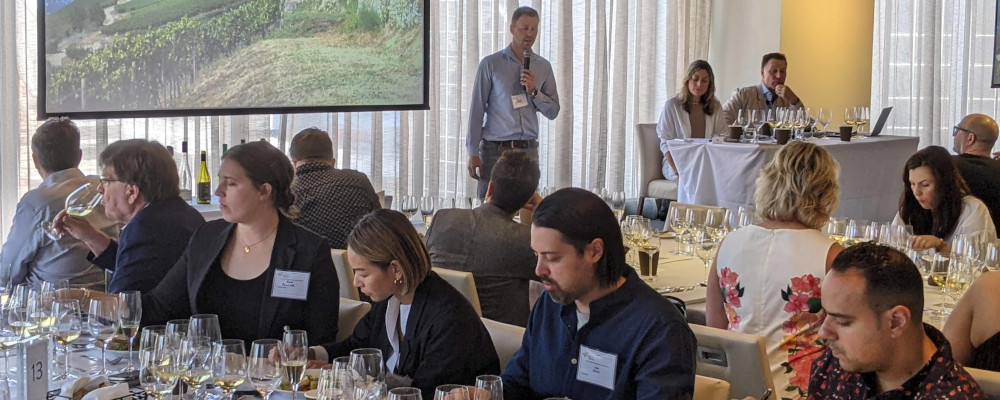It occurred to me this week that things really are opening up. The occurrence happened on a Toronto Transit Commission subway train when I realized I had forgotten to put on my mask. This was quickly followed by the realization that I had forgotten to bring a mask. And then, after a glancing survey, the realization that I was in good bare-faced company with about half of the other mid-morning riders in the car. It was going to be okay.
If I had been paying attention, it might have occurred to me that the world (and particularly the weird wine world in which I inhabit) was opening up when I looked at my calendar to see that I had scheduled my attendance at three organized tastings in as many weeks. On the subway train, I was headed for more than just a tasting: this time it would be lunch. I had remembered wine lunches from the distant times of the 2010s and the first two or three months of 2020, so maybe it was the excitement of the idea that they have come back that made me forget my mask in the first place.
The wine world has its own system of honours, or rather, two systems that are friendly competitors. Both require their honourees to be tested in a years-long series of academic and practical ordeals which culminate in the right of successful candidates to suffix initials after their name. From Britain’s old guard wine trade is the Master of Wine (MW). From America’s shirtsleeve tradition is the Master Sommelier (MS).“The Court of Master Sommeliers was established to encourage improved standards of beverage knowledge and service in hotels and restaurants. The first successful Master Sommelier examination was held in the United Kingdom in 1969. By April 1977, the Court of Master Sommeliers was established as the premier international examining body. Though its members worldwide come from diverse backgrounds and experiences, they share a proven mastery of the art, science, and history that informs a sommelier’s work.” https://www.mastersommeliers.org/about#:~:text=How%20does%20someone%20become%20a,Master%20Sommelier%20diploma%20and%20title. This lunch would be presided by two of Canada’s resident MSs, Jennifer Huether and John Szabo, and so the invitation promised a “Master Class” in the wines of Germany.
I have written previously, and relatively recently, in this space on why I believe German wines are woefully under-appreciated by, and offer tremendous value to, the wine drinkers of Canada.Decoding Riesling labels is worth the trouble for a wine that ‘keeps its promise’ https://thehub.ca/2021-09-24/decoding-riesling-labels-is-worth-the-trouble-for-a-wine-that-keeps-its-promise/ The lunch did nothing to change my opinion. But in four courses, paired with four flights of sparkling (Sekt), rosé (Spätburgunder, aka Pinot Noir), white (Riesling and Grauburgunder, aka Pinot Gris) and red (more Spätburgunder), that lunch reaffirmed my faith in all things good and fun in wine, hospitality, and the pleasures of sitting down with other human beings at the table.
The tasting, or lunch, or whatever it was, really was fun in the sense that the MSs Huether and Szabo really played around with the pairings. Huether is an outspoken vegan and paired the sparkling wine with asparagus (usually considered unfriendly to wine) and a new wave plant-based product called The Future of Butter. Szabo is very much not a vegan, but as a provocateur paired Riesling with lamb chops grilled with lemon and thyme, on the suggestion of the Quebecois molecular gastronomist François Chartier. It was a success and their audience was happy to play along. We had come, it seemed a long way away from making your own sourdough and single sheet pan dinners in April 2020.
The other way the lunch was life-affirming, as they may say in yoga class, was how it was served. It was held in an event space in downtown Toronto run by the multi-restaurant concern, Oliver & Bonacini. The waitstaff was young, and by my reckoning not super experienced. There were screw-ups here and there, but they were acknowledged, apologized for, and then quickly rectified. There’s not a lot more one can ask these days. The pandemic was hard on restaurant staffing; many experienced professionals left the industry when work was uncertain at best and non-existent for months on end in lock-down.
Restaurant service everywhere is a bit spotty in the post-pandemic risorgimento, but that, along with maskless subway riders, is okay. The bums in the seats, like me, are happy to be out once more, and those working hard to provide hospitality seem happy to be engaged in the world once more. More than one old hand in the restaurant business has confided in me over the years that it’s easy to teach technique but pretty much impossible to teach attitude.
Speaking of a resurgence of the hospitality industry, which has always been the sharp end of the wine trade stick, I had a very interesting conversation recently with James Peden. Peden, the thirty-something sommelier is the Director of Operations for the Liberty Entertainment Group, another Toronto restaurant concern. When he’s not managing the century-old cellar at Casa Loma, Peden volunteers as the Chair of the Ontario chapter of the Canadian Association of Professional Sommeliers.
Newly elected, along with Vice-Chair Stephanie Guth, Portfolio Manager at the all-organic import agency The Living Vine, Peden is steering CAPS’ programming towards the further professionalization of the sommelier metier. An all-volunteer organization comprised of working sommeliers and “front of the house” industry professionals, CAPS Ontario has reenergized its sommelier certification program, in collaboration with George Brown College in Toronto and Niagara College in Ontario wine country.CAPS Professional Sommelier Certification Program http://sommelierscanada.com/ontario/programs/caps-professional-sommelier-certification-program
The professionalization of the restaurant trade and the wine trade was happening before the pandemic shut it down. Like so many trends it appears only to have been accelerated by the upheaval of the pandemic. As Peden told me, whereas traditional certification programs, like MS and MW mentioned above, have been heavy on academics or service practice, the CAPS program combines business theory and practice as well.
Things are definitely opening up.
Recommended for You

Michael Kaumeyer: Polite decline: Canada’s aversion to being our best is holding us back

Howard Anglin: Lament for a Lament

‘A place where anybody, from anywhere, can do anything’: The Hub celebrates Canada Day

Peter Menzies: It’s no wonder Canadians are tuning out the legacy media




